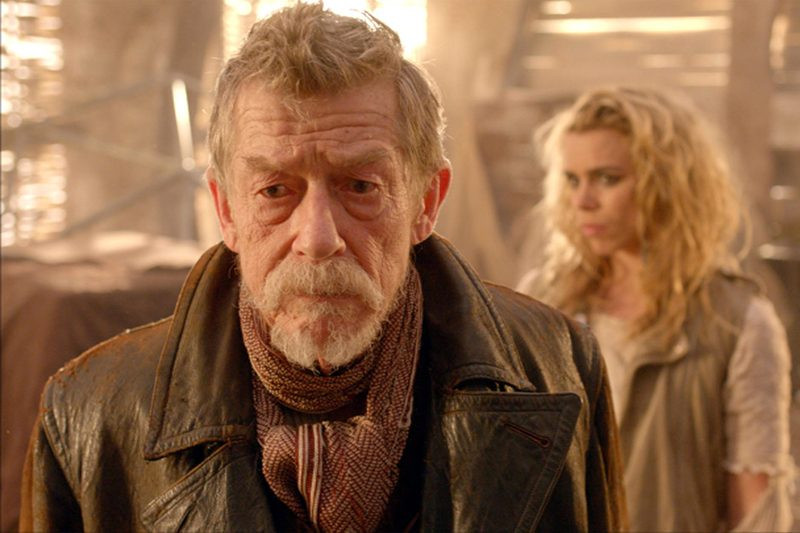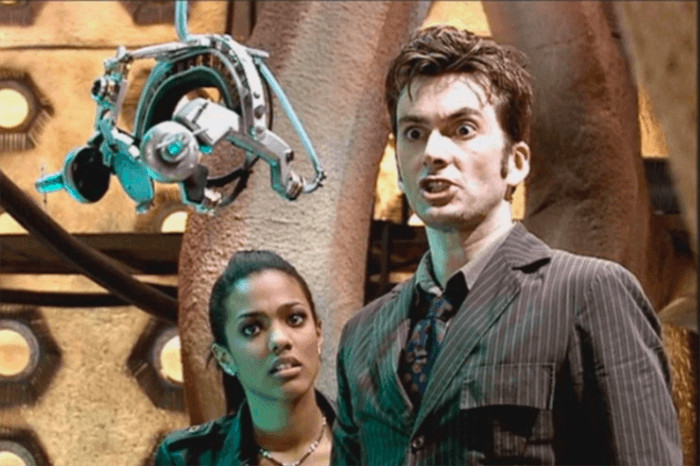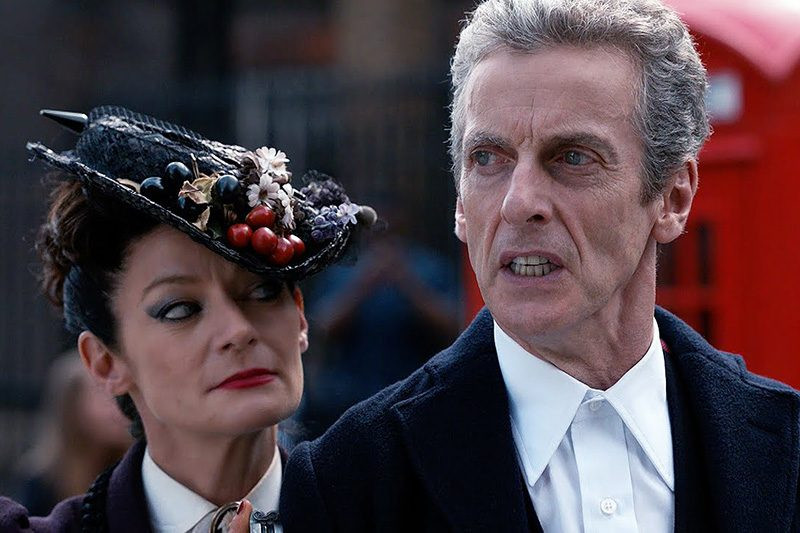For decades, the enigmatic Time Lord known as the Doctor has captivated audiences across the globe. Traveling through time and space in their iconic TARDIS, the Doctor has faced countless threats, always introduced simply as… well, the Doctor. But this begs a fundamental question that has intrigued fans since the very beginning: Doctor Who, what is the Doctor’s name? It’s a question the series itself has playfully dodged, hinted at, and outright refused to answer, adding to the character’s mystique. Let’s delve into the intriguing mystery surrounding the Doctor’s true moniker and explore the various theories that have emerged over the years.
The Doctor’s Reluctance to Reveal His Name
The secrecy surrounding the Doctor’s name is not accidental; it’s a deliberate choice on the part of the Time Lord. As far back as the Tenth Doctor’s era, portrayed by David Tennant, the gravity of revealing his name was emphasized. In a memorable encounter with River Song, the Doctor was visibly shaken that she knew his name, proclaiming that there was only one circumstance in which he would ever share such intimate information. This moment hinted at the immense personal significance and perhaps even danger associated with uttering his true name. While the exact reason remained shrouded in mystery, the scene underscored the Doctor’s strong desire to keep his name private.
Adding to the enigma, other beings within the Doctor Who universe have alluded to the hidden nature of his name. The Carrionite Lilith, a powerful witch-like entity, suggested the Doctor concealed his true name “in despair.” Similarly, the psychic Evelina, a Roman teenager, sensed that the Doctor’s “true name” was deeply hidden, even from her considerable abilities. These encounters further solidified the notion that the Doctor’s name is not merely a matter of personal preference but a secret of profound importance.
During the Eleventh Doctor’s lifetime, portrayed by Matt Smith, the mystery surrounding his name reached new heights. Dorium Maldovar ominously declared that the question “Doctor Who?” was “The question that must never be answered.” Powerful adversaries like the Great Intelligence sought to uncover this secret, while the sinister Silence, a religious order and monster club, dedicated their existence to preventing the Doctor from ever revealing it. This escalated secrecy suggested that the Doctor’s name held immense power and potentially universe-altering consequences.
In a dramatic revelation during the Eleventh Doctor’s regeneration, it was revealed that the Time Lords themselves had chosen the Doctor’s real name as the signal for their return to the universe. This revelation triggered a massive galactic conflict, highlighting the sheer power and significance embedded within that single word. However, Clara Oswald, a pivotal companion, intervened and convinced the Time Lords that the name “the Doctor” – the chosen title – was the name that truly mattered, effectively defusing the potentially catastrophic situation.
Clara herself had a fleeting glimpse into the Doctor’s true name through a book titled The History of the Time War. Unfortunately, thanks to some timey-wimey interference, she lost all memory of it, leaving both her and the audience perpetually in the dark. Adding another layer of complexity, the revelations in The Timeless Children, featuring Jodie Whittaker’s Doctor, cast doubt on whether even the Doctor is aware of their original birth name, given the profound manipulations of their past. This intricate web of secrecy and mystery only deepens the fascination surrounding the question: what could the Doctor’s real name possibly be?
Despite the Doctor’s clear wishes and the potential universal implications, let’s bravely – or perhaps foolishly – explore some of the most compelling theories about what the Doctor might actually be called.
Theories About the Doctor’s Name
Is “The Doctor” His Real Name?
 John Hurt as The War Doctor
John Hurt as The War Doctor
Could it be that the simplest answer is the correct one? Could “the Doctor” actually be his given Gallifreyan name? While seemingly straightforward, evidence suggests otherwise. In The Name of the Doctor, the Eleventh Doctor explicitly told Clara that he chose the name “the Doctor” as a promise. This promise was a personal oath “never to be cruel or cowardly,” “never to give up,” and “never to give in.” This declaration strongly implies that “the Doctor” is a title, a mantle adopted with profound intent, rather than a birth name. Notably, during the devastating Time War, the Doctor refused to use this title, believing his actions during that dark period did not live up to the noble ideals it represented.
Further supporting the alias theory, the Valeyard, a morally ambiguous figure representing the darker aspects of the Doctor’s future selves, referred to the name as an alias. Even the Doctor’s nemesis, the Master, in his John Simm incarnation, mocked the Doctor for branding himself as “the man who makes people better,” highlighting the chosen nature of the title.
Interestingly, River Song offers a contrasting perspective, suggesting that humanity, and indeed the universe, derived the word “Doctor” – meaning “healer and wise man” – from tales of the Doctor’s legendary exploits. This theory, initially proposed by Steven Moffat in an online chatroom decades ago, suggests the Doctor’s actions and reputation preceded and shaped the very concept of a “doctor” throughout the cosmos. While the Doctor has demonstrably acquired several actual doctorates, including a seemingly less relevant one in cheese-making, these academic achievements appear to be more humorous additions to his persona than confirmations of his given name.
John Smith: A Common Alias
 David Tennant and Freema Agyeman in Doctor Who (BBC)
David Tennant and Freema Agyeman in Doctor Who (BBC)
“John Smith” stands as the Doctor’s most frequently used alias, second only to “the Doctor” itself. This unassuming name serves as his standard pseudonym when blending into human society, particularly on Earth. The Third Doctor, played by Jon Pertwee, utilized it extensively during his exile to Earth in the 1970s and 80s. The alias remains in use even in later incarnations, such as when the Twelfth Doctor went undercover as a caretaker at Coal Hill School. In a dramatic turn of events, the Tenth Doctor even became John Smith in a literal sense, transforming into a human to evade the relentless Family of Blood. Adding a touch of everyday absurdity, “John Smith” is also the name on the Doctor’s library card, a detail that playfully highlights the alias’s mundane yet pervasive nature.
Theta Sigma: A Gallifreyan Nickname
Theta Sigma, or ΘΣ in Greek letters, emerges as a potential glimpse into the Doctor’s past and perhaps a clue to his real name. This nickname was bestowed upon the Doctor during his time at the Time Lord Academy on Gallifrey. Drax, a fellow student from “the class of ’92” who re-encountered the Fourth Doctor, revealed this piece of Time Lord schoolyard trivia.
The introduction of Theta Sigma by writer Anthony Read with Drax could have been a subtle, albeit easily missed, attempt to answer the overarching question of the series’ title within casual dialogue. However, this potential reveal was largely disregarded and interpreted as a simple, humorous nickname, a notion later reinforced by the Seventh Doctor in The Happiness Patrol.
Despite its nickname status, Theta Sigma might still hold a connection to his actual name. Nicknames often, though not always, derive from or relate to the real name (unless you’re indeed Sting). Delving further, The Making of Doctor Who, a reference guide from 1972 authored by script editor Terrance Dicks and writer Malcolm Hulke, casually mentioned that the Doctor’s real name was δ³Σx². Theta Sigma could then be interpreted as a simplified, pronounceable, and perhaps more jovial variant of this complex Gallifreyan designation. Whether this is a genuine link or a playful coincidence remains open to interpretation, particularly for those for whom Gallifreyan nomenclature is, quite literally, Greek to them.
Names Given by Enemies
 Matt Smith in Doctor Who (BBC)
Matt Smith in Doctor Who (BBC)
Throughout his long and storied existence, the Doctor has accumulated a collection of rather impressive, if somewhat intimidating, titles bestowed upon him by his adversaries. Names like “The Oncoming Storm,” “The Beast,” “Predator of the Daleks,” “The Great Exterminator,” and “The Destroyer of Worlds” paint a picture of a formidable and often feared figure. While these are certainly not birth names, they speak volumes about the Doctor’s impact on the universe and the perception of him by those who oppose him. Interestingly, these names are undeniably cool and evocative. One might even argue that if his enemies truly wanted to unsettle him, they should resort to something far more mundane and embarrassing, like “Custard Face.”
An Unpronounceable Name?
The idea that the Doctor’s real name is simply unpronounceable to human tongues has also been floated within the Doctor Who universe. The Sixth Doctor, during a radio appearance on BBC Radio 4, reportedly told companion Peri that his real name was beyond human pronunciation. While the canonicity of this radio comment might be debated, it introduces an intriguing possibility. It’s worth noting that the Sixth Doctor, known for his abrasive personality, might have simply been expressing his characteristic disdain for other species, particularly Americans in this instance, rather than stating a literal truth.
However, the notion of an incomprehensible name resurfaced later. In his final moments, the Twelfth Doctor, portrayed by Peter Capaldi, suggested his name was largely incomprehensible, except perhaps to a child with a pure heart. This later reference lends a degree of credibility to the idea that the Doctor’s true name might indeed be beyond the grasp of typical human phonetics, making it a secret protected not just by intent but also by inherent linguistic barriers.
Doctor Who: Hidden in Plain Sight?
 Peter Capaldi and Michelle Gomez in Doctor Who (BBC, HF)
Peter Capaldi and Michelle Gomez in Doctor Who (BBC, HF)
Perhaps the most audacious and playfully meta theory is that the Doctor’s real name is, in fact, “Doctor Who.” This theory posits that the answer to the question has been staring us in the face – or rather, emblazoned on our screens – for decades. Remarkably, evidence for this theory dates back to 1966 in the William Hartnell era story The War Machines. In this episode, the sentient supercomputer Wotan explicitly declares, “Doctor Who is required, bring him here.” While the likely real-world explanation for this line is a writer’s oversight, or perhaps a deliberate in-joke, within the fictional universe, it’s a statement that cannot be easily ignored.
Wotan’s declaration, though potentially a computer error in-universe (“computer says Who”), is not an isolated incident. In the Patrick Troughton era, the Second Doctor, while masquerading as a German, adopted the alias “Doctor von Wer” – literally “Doctor of Who.” Furthermore, he signed a message simply “Dr W.” These instances, combined with the countless “Doctor? Doctor who?” gags peppered throughout the series, build a cumulative, if whimsical, case for “Doctor Who” as the actual name.
Dorium Maldovar’s ominous warning further fuels this theory. His full quote, “The first question. The question that must never be answered, hidden in plain sight. The question you’ve been running from all your life. Doctor who? Doctor who? Doctor who?” strongly suggests the answer is indeed “hidden in plain sight.” What could be more “in plain sight” than the very title of the show, the name that zooms across the screen at the start of every episode? When considered in this light, the seemingly absurd idea becomes strangely compelling.
Michelle Gomez’s Missy, in her chaotic and insightful way, also championed this theory. When briefly stepping into the Doctor’s role during a training exercise in World Enough and Time, she proclaimed herself “Doctor Who” and insisted that it truly is his name. According to Missy, the Doctor chose the name himself, initially intending to sound mysterious but then dropping the “Who” when he realized it was “a tiny bit on the nose.” Even the Doctor, in response to Missy’s claim, doesn’t outright deny it, stating, “You see this mad woman sitting in this chair? Her name is not Doctor Who, my name is Doctor Who.” When questioned by Nardole, “It’s not, is it?”, the Doctor simply replies, “I like it.”
This ambiguous exchange, coupled with the accumulated in-universe hints and the meta-narrative clues, makes a surprisingly strong case for “Doctor Who” being, if not his birth name, then the name he has fully embraced and perhaps even made his true name in spirit. Especially considering the revelations of The Timeless Children, which suggest the Doctor’s past is far more complex and unknown than previously imagined, perhaps embracing the mystery and accepting “Doctor Who” as the answer is the most fitting conclusion. After all, as Steven Moffat himself has mused, maybe the answer has been right there all along.
Conclusion: The Enduring Mystery of the Doctor’s Name
Ultimately, the question of Doctor Who, what is the Doctor’s name? remains officially unanswered. The series has masterfully crafted a web of misdirection, playful hints, and deliberate obfuscation, turning the Doctor’s name into one of its most enduring and intriguing mysteries. Whether his real name is “Doctor Who,” something unpronounceable, a forgotten Gallifreyan designation, or simply irrelevant next to the promise embodied in the title “the Doctor,” the mystery continues to fuel fan speculation and add to the timeless allure of Doctor Who. Perhaps, in the end, the true answer is that the Doctor’s name is not as important as the heroic and compassionate figure he has chosen to be.
This article was previously published in 2017.
Doctor Who is available to stream on BBC iPlayer with episodes of the classic series also available on BritBox – you can sign up for a 7-day free trial here.
For more, check out our dedicated Sci-Fi page or our full TV Guide and Streaming Guide.
Ad
Try Radio Times magazine today and get 12 issues for only £1 with delivery to your home – subscribe now. For more from the biggest stars in TV, listen to The Radio Times Podcast.

